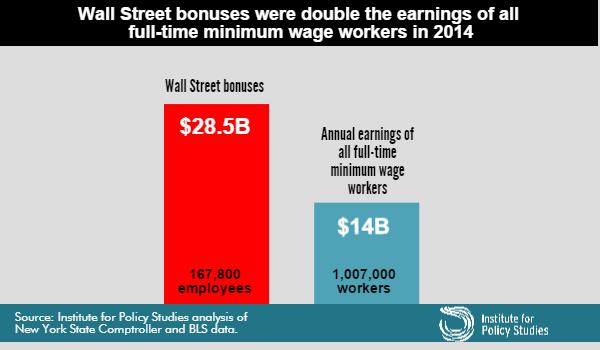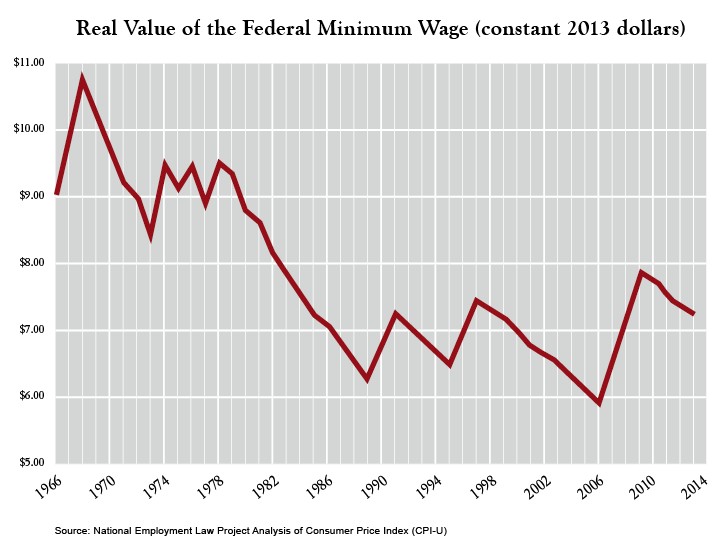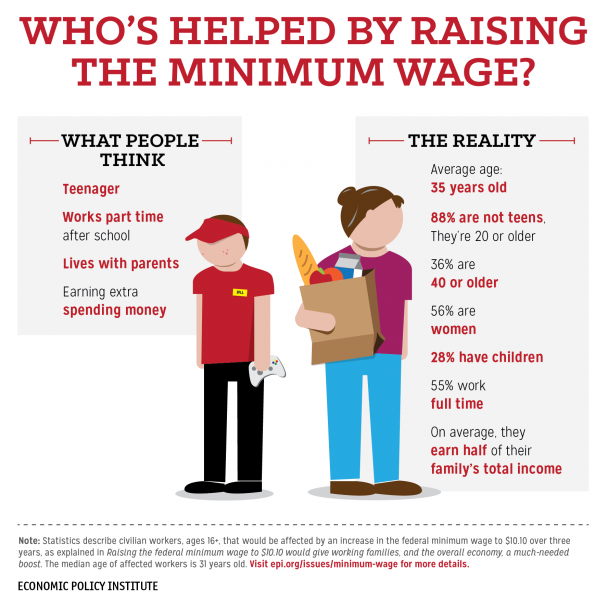|
MINIMUM WAGE and ITS IMPACT
"We stand for a living wage. Wages are subnormal
if they fail to provide a living for those who devote their time
and energy to industrial occupations. The monetary equivalent
of a living wage varies according to local conditions, but must
include enough to secure the elements of a normal standard of
living—a standard high enough to make morality possible,
to provide for education and recreation, to care for immature
members of the family, to maintain the family during periods of
sickness, and to permit of reasonable saving for old age."
Theodore Roosevelt, Confession of Faith, 8/6/1912
Basic
Family Budget Calculator EPI
US
Minimum Wage Compared to other OECD

Source: http://www.ips-dc.org/deep-end-wall-street/
Award-Winning Study: Minimum
Wage—Solid Benefits, Small Costs CBPP6/15
America
as a whole is an outlier among advanced economies

Higher
minimum wages are associated with greater financial well-being,
Krassa & Radcliffe. LSE 11/14
$15
Is the New $10.10, USNWR, 6/14
"The minimum wage of the past was a stronger standard, providing
significantly more buying power than it does today. After its
creation in 1938, the value of the minimum wage rose relatively
steadily until its value reached a high point in 1968 (when its
nominal value was $1.60 an hour). Thereafter, it suffered dramatic
erosion as Congress failed to adequately correct for inflation
over time." [for source, see graph below.]
Source: http://www.raisetheminimumwage.com/facts/entry/amount-with-inflation/
Raising
the Minimum Wage Boosts Growth and Does Not Cause Unemployment
Pacitti, Huff. Post, 4/15
2014
Job Creation Faster in States that Raised the Minimum Wage,
CEPR 6/14
Low-wage
Workers Are Older Than You Think, Cooper & Essrow,
EPI 8/13 
Source:http://www.epi.org/publication/wage-workers-older-88-percent-workers-benefit/
Why
Does the Minimum Wage Have No Discernible Effect on Employment?
Schmitt, CEPR 2/13
Minimum
wage laws in the states DOL 1/13
Increase
and Index the Minimum Wage, Hall, EPI 2/12
"The [Fair Labor Standards 1938] act—which also
established time-and-a-half pay for overtime and restricted child
labor — first set the minimum hourly wage at 25 cents. ....
No one ever wants to make just the minimum, but the best time
to have done so was 40 years ago. That’s when the minimum
wage was the equivalent of $10.11 in 2008 dollars." "Keeping
an Eye on the Low Point of the Pay Scale," NYTimes,
8/31/08, Korkki
"An estimated 2.8 million employees will get a raise
on Friday [7/24/09] as the federal minimum wage rises from $6.55
an hour to $7.25. Another 1.6 million whose hourly pay hovers
around $7.25 are also expected to get a boost as employers adjust
their pay scales to the new minimum. The raise is badly needed.
It is also wholly inadequate.
With the latest increase, the minimum wage is still no higher
now, after inflation, than it was in the early 1980s, and it is
17 percent lower than its peak in 1968. That means that no matter
how hard they work, many low-wage workers keep falling behind.
The latest increase will slow the decline in living standards,
but it doesn’t reverse the overall downward pull.
Even that understates the broader dimensions of the problem.The
minimum wage also sets a floor by which other wages are set. Keeping
it low keeps wages lower than they would be otherwise, especially
for jobs that are just above the minimum-wage level. That’s
a big problem for American workers because low-wage fields are
the ones that are adding the most jobs.
According to the Labor Department, 5 of the 10 occupations expected
to add the most jobs through 2016 are “very low paying,”
up to a maximum of about $22,000 a year. They include retail sales
jobs and home health aides. Another 3 of the 10 are “low
paying,” from roughly $22,000 to $31,000, including customer-service
representatives, general office clerks and nurses’ aides."
NYTimes Editorial, July 24, 2009
Consider
the Source: 100 Years of Broke- Record Opposiion
to the Minimum Wage NELP, 3/13
Strengthening
the EITC and raising the minimum wage should go hand-in-hand,
Cooper 1/13
Minimum
Wage Indexingprotects
nearly a million low-wage workers this New Year Cooper
12/12
Time
to Raise the Minimum Wage, EPI 7/12
Hardworking
Americans should not be living in poverty, CNN 7/12
Economic
research supports raising the minimum wage, Eisenbrey
7/12
Confronting
Low Pay: Minimum Wage Policy and Employment in the
U.S. and France, Howell, Azizoglu, & Okatenko, PERI 9/12
Low-wage
Workers Are Older and Better Educated than Ever,
Schmitt & Jones, CEPR 4/12
Minimum
Wage and Productivity, Schmitt 3/12
Affording
Health Care and Education on the Minimum Wage, Schmitt
& Augier, 3/12
Raise the
Minimum Wage NELP website
Most
minimum wage workers are not teenagers,
Cooper, EPI, 1/12
Raising
the Minimum Wage in Hard Times, Sklar, 10/10
Minimum Wage: EPI Issue Guide, 7/09
Minimum
wage stuck in the 1950s, Sklar, 7/09
Minimum
wage workers: better educated, worse compensated,
7/09
Increases
in minimum wage boost consumer spending, Filion,
EPI, 5/09
Fact
Sheet: “Fair Minimum Wage Act of 2007”
First
Federal Wage Hike in 10 Years, Brennen Ctr
Hundreds
of Economists Say: Raise the Minimum Wage
"There is nothing but a lack of
social vision to prevent us from paying an adequate wage to every
[American] whether he [she] be a hospital worker, laundry worker,
maid or day laborer." Rev. Dr. Martin Luther King, Jr.
Where Do We Go From Here: Chaos or Community?, 1967 quoted
by Sklar and Sherry,
A Just Minimum Wage: Good For Workers, Business and Our Future
Job
Slayers or Fact Slayers? The Wall Street Journal's flawed argument
against raising the minimum wage
Citywide
Minimum Wage Laws: A New Policy Tool for Local Governments
6/05
Labor/Working
Families--Civil Rights Coalition
Labor
Markets, Wages and Poverty--Political Economy Research Institute
UMASS
See Resources: Living
Wage
|

